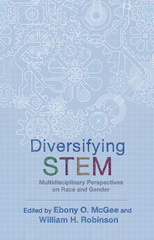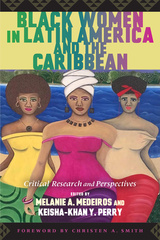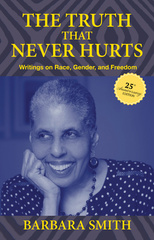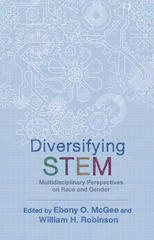296 pages, 6 x 9
0 images
Paperback
Release Date:15 Nov 2024
ISBN:9781978843295
Hardcover
Release Date:15 Nov 2024
ISBN:9781978843301
Black Feminist Anthropology, 25th Anniversary Edition
Theory, Politics, Praxis, and Poetics
By Irma McClaurin; Foreword by Johnetta Betsch Cole
Rutgers University Press
In the discipline's early days, anthropologists by definition were assumed to be white and male. Women and black scholars were relegated to the field's periphery. From this marginal place, white feminist anthropologists have successfully carved out an acknowledged intellectual space, identified as feminist anthropology. Unfortunately, the works of black and non-western feminist anthropologists are rarely cited, and they have yet to be respected as significant shapers of the direction and transformation of feminist anthropology.
In this volume, Irma McClaurin has collected—for the first time—essays that explore the role and contributions of Black feminist anthropologists. She has asked her contributors to disclose how their experiences as Black women have influenced their anthropological practice in Africa, the Caribbean, and the United States and how anthropology has influenced their development as Black feminists. Every chapter is a unique journey that enables the reader to see how scholars are made. The writers present material from their own fieldwork to demonstrate how these experiences were shaped by their identities. Finally, each essay suggests how the author's field experiences have influenced the theoretical and methodological choices she has made throughout her career.
Not since Diane Wolf's Feminist Dilemmas in the Field or Hortense Powdermaker's Stranger and Friend have we had such a breadth of women anthropologists discussing the critical (and personal) issues that emerge when doing ethnographic research.
In this volume, Irma McClaurin has collected—for the first time—essays that explore the role and contributions of Black feminist anthropologists. She has asked her contributors to disclose how their experiences as Black women have influenced their anthropological practice in Africa, the Caribbean, and the United States and how anthropology has influenced their development as Black feminists. Every chapter is a unique journey that enables the reader to see how scholars are made. The writers present material from their own fieldwork to demonstrate how these experiences were shaped by their identities. Finally, each essay suggests how the author's field experiences have influenced the theoretical and methodological choices she has made throughout her career.
Not since Diane Wolf's Feminist Dilemmas in the Field or Hortense Powdermaker's Stranger and Friend have we had such a breadth of women anthropologists discussing the critical (and personal) issues that emerge when doing ethnographic research.
This refreshing and inspiring collection of nine articles and a superb introduction seeks to come to terms with, if not resolve, the triple contradictions found in the title. Each author brings personal experiences of racism, sexism, and other challenges to bear on what are without exception successful examples of what C. Wright Mills called ‘the sociological imagination,’ where biography, intellectual activity, and activism are presented as a seamless whole.
What is so powerful about these women’s voices is that their theory is based not only on a self-reflexive and autobiographical framework, but it is positioned in a framework that boldly declares its commitment to scholarship, theory-making, and social justice. It is a very important book for anthropology, for feminist studies, for African American studies—and ultimately for all of us.
[Black Feminist Anthropology] boldly disrupts naïve assumptions of an inclusive anthropology [and] places at center questions of positionality and subjectivity when the researchers are Black and female, and the 'consultants' are Black women. [The book] provides a meaningful analysis of the complexities of race and gender research, particularly since these categories are multiple and shifting largely based on history and locale.
This anthology provides a new level of positive visibility and support to Black women creatively engaged in the Black feminist praxis of intellectual activism. Even more important, it serves as a Black feminist strategic intervention in the critical task that Lather has described as 'produc[ing] different knowledge and ... produc[ing] knowledge differently' (Vol. 27, No. 1, Autumn 2001, Pg. 200). This anthology must be read by anthropologists who want to contribute to discussions about the issues raised by the essays in this book and by those of us who are excited by and devoted to the development of interdisciplinary Black feminist praxis.
Anthropologists [in this collection]...disclose how their experiences as Black women have influenced their anthropological practices in Africa, the Caribbean, and the U.S., and how anthropology has influenced their development as Black feminists...The authors write eloquently on the complex mix of personal and professional that dominate their lives.
Black Feminist Anthropology makes a provocative and important contribution to contemporary Black feminism. For the authors in this book, the premise that scholarship and social justice agendas must inform one another fosters a new anthropology that promises to stimulate new questions for us all.
Black Feminist Anthropology has been an intellectual touchstone guiding my research, teaching, and institutional leadership practices for the past 25 years. Having impacted the fields of anthropology and gender and women’s studies then in profound ways, it is needed now more than ever as we continue to center the experiences of Black women in theory and practice in the academy and in society.
A groundbreaking and vital book that centers the voices and visions of Black women in anthropological research. This book is as imperative today as it was twenty-five years ago.
Like few other texts, Black Feminist Anthropology gives Black women social scientists a history. From recovering Zora Neale Hurston’s intellectual labors as an anthropologist to offering autoethnographic windows into contemporary Black feminist knowledge-making, this collection embodies the belief that Black women’s lived experiences matter.
Irma McClaurin and her colleagues bring Black Feminist Anthropology into the center of the discipline. Each of these carefully crafted essays combines personal biography with ethnographic insights to forge a feminist analysis of the complex relationship of race, class, and gender in the lives of Black women. Black Feminist Anthropology is an essential text for those who want to read cutting edge anthropological theory.
I read Black Feminist Anthropology in Adwa, Ethiopia where rural women participated in the revolution against their oppressors. This seminal work demonstrates why empowerment, then and now, must include storytelling. Being all Black and Feminist anthropologists, these authors tell stories beyond the boundaries of the White academic canons and traditions and the male gaze to enrich the legacy of knowing and as actors for change. This classic must be read by all practicing anthropologists in the 21st century.
As a graduate student, it has been a balancing act of learning to reconcile the fraught nature of the discipline of anthropology with my dreams of becoming a Black Feminist anthropologist who works to unsettle the Black experience in a time of increasing ecological precarity. This collection is a source of wisdom, healing, and empowerment.
Black Feminist Anthropology: Theory, Politics, Praxis and Poetics is a pathbreaking and landmark contribution to the field of anthropology paving the way for new methodological and theoretical directions. The book is an essential text for examining the significance of Black women’s impact in fields far and wide including dance studies, performance studies, masculinity studies, and queer theory.
Irma McClaurin is an impressive scholar and advocate for justice. I am deeply grateful for her insights into racial justice in the academy, and into structural racism and sexism more generally. Her work is essential to anyone concerned with re-establishing trust in and between our educational, social, and governmental institutions.
Even before recent groundbreaking interventions disrupted mainstream anthropology’s white, masculinist narratives, like the 'Cite Black Women' movement, there was Black Feminist Anthropology. This trailblazing collection remains more relevant than ever today as we work to decolonize our thinking, acknowledging long-buried truths about anthropology’s complex racialized and gendered histories and legacies.
In the beginning of Black Feminist Anthropology, Irma McClaurin calls the book an 'intervention,' and for the last 25 years, it has been the bedrock for many interventions into the study of Black life, Black women's lives, and Black diasporic studies. While this book has launched and given support to the work of many, I had the honor of bringing it into my classroom and creating a course with the same name: Black Feminist Anthropology. Dr. Irma McClaurin was a guest lecturer in this interventionist course, and since then, students have told me how important the course was to them in strengthening their sense of self in the academy. This class and the pedagogy I designed to support it were built on top of the foundational house established by Irma McClaurin with the development and publication of 'Black Feminist Anthropology,' three words that have built and continue to sustain a decolonized anthropology that centers Black women's knowledge production in theory, politics, praxis, and poetics.
IRMA McCLAURIN, Black feminist speaker, is the CEO of Irma McClaurin Solutions (IMS), aka McClaurin Solutions, a leadership consulting business. She is an activist anthropologist, award-winning author, Black feminist archive founder, diversity champion, and community engagement specialist. She specializes in helping others find immediate and sustainable solutions to emerging and urgent issues. McClaurin offers support as a leadership consultant and guru, an executive coach, researcher, motivational speaker, workshop facilitator, writer/editor, and diversity strategist. This Black feminist speaker is also a Solutions Executive and a past president of Shaw University, former Chief Diversity Officer at Teach For America, free-lance writer and editor, and mentor who has committed her life and career to helping others transform the world. She holds the PhD and MA in Anthropology and the Masters of Fine Arts (MFA) in English, both from the University of Massachusetts Amherst. She resides in Raleigh, North Carolina.
JOHNETTA BETSCH COLE became the first African American woman to serve as president of Spelman College in 1987. After a decade of service at Spelman, she joined the faculty at Emory University as Presidential Distinguished Professor of Anthropology, Women’s Studies, and African American Studies. She went on to serve as president of Bennett College, the only other historically Black College for Women, and then on to serve as the Director of the Smithsonian National Museum of African Art. She is the author or co-author of many books, including All-American Women: Lines that Divide, Ties that Bind; Gender Talk: The Struggle for Women’s Equality in African American Communities; Conversations: Straight Talk with America’s Sister President; and Speechify: The Words and Legacy of Johnnetta Betsch Cole. She is the recipient of a National Humanities Medal, and 70 honorary degrees. She resides in Fernandina Beach, Florida.
JOHNETTA BETSCH COLE became the first African American woman to serve as president of Spelman College in 1987. After a decade of service at Spelman, she joined the faculty at Emory University as Presidential Distinguished Professor of Anthropology, Women’s Studies, and African American Studies. She went on to serve as president of Bennett College, the only other historically Black College for Women, and then on to serve as the Director of the Smithsonian National Museum of African Art. She is the author or co-author of many books, including All-American Women: Lines that Divide, Ties that Bind; Gender Talk: The Struggle for Women’s Equality in African American Communities; Conversations: Straight Talk with America’s Sister President; and Speechify: The Words and Legacy of Johnnetta Betsch Cole. She is the recipient of a National Humanities Medal, and 70 honorary degrees. She resides in Fernandina Beach, Florida.












